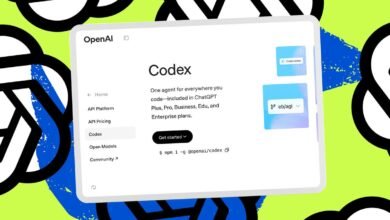OpenAI’s Codex Gets Major Upgrade with New GPT-5 Model

▼ Summary
– OpenAI released GPT-5-Codex, a new version for its AI coding agent Codex, which dynamically adjusts its processing time from seconds to hours for better performance on coding benchmarks.
– The model is now available to all ChatGPT Plus, Pro, Business, Edu, and Enterprise users through various platforms, with future API access planned.
– This update aims to make Codex more competitive in the crowded AI coding tools market, which includes rivals like Claude Code and GitHub Copilot.
– GPT-5-Codex outperforms GPT-5 on agentic coding and code refactoring benchmarks and was trained for code reviews, receiving positive feedback from engineers for accuracy and impact.
– The model’s dynamic thinking ability allows it to adjust processing time in real-time without a router, offering an advantage over systems that pre-allocate resources.
OpenAI has launched a significant upgrade to its AI coding assistant, Codex, integrating the new GPT-5-Codex model designed to enhance performance on complex programming tasks. This latest iteration introduces a more dynamic approach to processing time, allowing the system to allocate anywhere from a few seconds to several hours to solve coding challenges, resulting in marked improvements on agentic coding benchmarks.
The updated model is now being deployed across Codex’s various platforms, including terminal access, integrated development environments, GitHub, and ChatGPT. Availability extends to all ChatGPT Plus, Pro, Business, Edu, and Enterprise subscribers, with plans to eventually offer access to API customers as well.
This release forms part of OpenAI’s broader strategy to strengthen Codex’s position in a rapidly expanding market for AI-powered coding tools. Competition has intensified over the past year, with rivals like Claude Code, Anysphere’s Cursor, and Microsoft’s GitHub Copilot all vying for user attention. Notably, Cursor achieved over $500 million in annual recurring revenue earlier in 2025, while another code editor, Windsurf, became the center of a contentious acquisition battle that ultimately divided its team between Google and Cognition.
According to OpenAI, GPT-5-Codex demonstrates superior performance compared to the standard GPT-5 model on the SWE-bench Verified benchmark, which evaluates agentic coding capabilities. It also excels in code refactoring tasks drawn from large, well-established code repositories.
In addition to code generation and refactoring, the model has been specifically trained to conduct code reviews. Experienced software engineers who evaluated GPT-5-Codex’s feedback reported that it produces fewer incorrect comments while contributing more high-impact observations.
Alexander Embiricos, Codex’s product lead at OpenAI, explained that a key factor behind these gains is the model’s dynamic “thinking abilities.” Unlike ChatGPT’s router system, which pre-determines computational allocation based on task complexity, GPT-5-Codex operates without a router and makes real-time adjustments to how long it spends on a problem. This flexibility allows it to reassess time needs mid-task, sometimes deciding after five minutes that an additional hour is necessary. In certain cases, Embiricos noted, the model has been observed working on a single problem for over seven hours.
(Source: TechCrunch)





